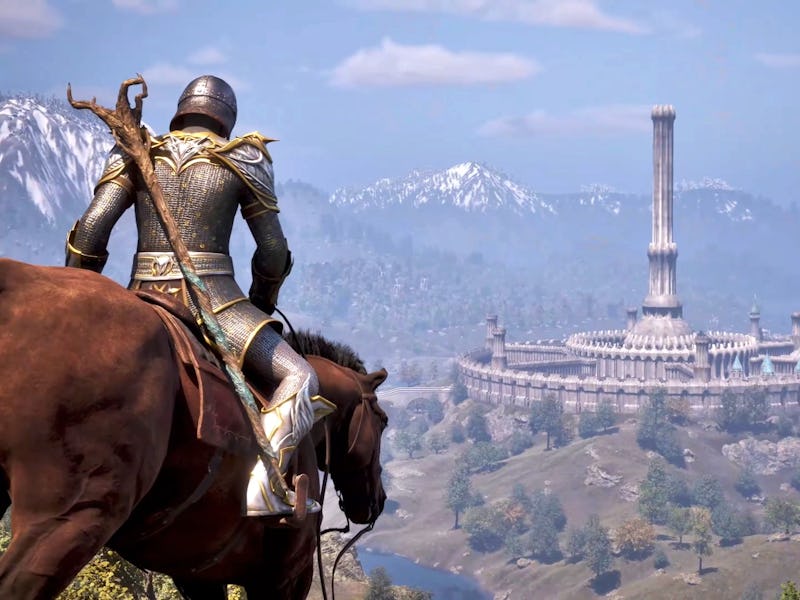
Jumping back into The Elder Scrolls IV: Oblivion nearly 20 years later, I had a sensation I’d never experienced playing a game before — a surprising sense of relief when I opened the world map. With modern games, I’ve been so trained to open that map and see a sprawling network of icons, towns, discoveries, and more. I’m so used to feeling overwhelmed by open-world games that the shocking simplicity of Oblivion stopped me in my tracks. That moment simultaneously made me think maybe open-world games, as a whole, have simply gone too far from their roots.
Experiencing Oblivion again has been a fascinating experience, as I can easily say it was a pivotal game in my life. It was my very first Xbox 360 game, and probably the first-ever true open-world game I’d played in my life. I recognize that I have nostalgic ties here, but Oblivion, and Morrowind before it, helped shape the very idea of what open worlds actually mean in games.
Oblivion is truly a game that’s what you make of it — the more you put into its freeform exploration, the more you get out.
This is where Bethesda’s design style really came into focus, and the way Oblivion encouraged exploration and experimentation was remarkable. It wasn’t the first time we’d seen its ideas, but the way Oblivion created dynamic NPCs and a world that felt lived-in was remarkable.
But going back to that experience two decades later has shown me that few open-world games these days really manage to capture that same feeling. Around the same time as Oblivion, we also started to see the Ubisoft style of open world, introduced in games like Far Cry and Assassin’s Creed. Those games were much more focused on diversity of content, providing players with countless collectibles and side quests — all very deliberately dolled out in a kind of manageable checklist.
Both these styles of open world were innovative at the time, but over the years, they morphed into a kind of Frankenstein monster. Games strive to provide that crucial element of exploration and discovery, but also want to have enough content to keep players invested for a hundred hours, with expansive worlds that never seem to end. Even beloved games like The Witcher 3 and Breath of the Wild are arguably simply too big. While those games have fantastic exploration and discovery, they can be intimidating even more the most hardcore of players. Beating either of those games is a major commitment, and that becomes even harder for parents or anyone with a job.
Oblivion’s map feels refreshing by today’s standards, a no-frills experience that allows for a lot of player freedom.
There’s also a sense of pressure to actually do all those things, whether it’s looking at the quest log itself, doing it for achievements, or the game itself rewarding you with story bits or equipment. Video games have, for better and worse, masterfully found a way to keep players invested, to get that carrot-on-a-stick experience.
Oblivion does a bit of that, but more than anything, it’s a freeform experience entirely molded by the player themselves — a bit of an immersive sim game in some ways. It’s a game entirely built on letting the player do what they want when they want, even if that can lead to problems along the way.
But the most crucial element is how that sense of choice is freeing, not overwhelming. Oblivion’s world is just big enough to feel realistic, but it doesn’t limit the player with any kind of progression. You can fast travel to every major city from the instant you leave the prologue, while smaller locations need to be discovered. This gives the player a real sense of choice and agency on how their journey plays out. There’s no unlocking bits of the map, no fog to remove, it’s all just there — right from the start.
At the same time, there are some 220-odd quests in Oblivion, but those quests are smartly doled out in increments supported by the game’s exploration focus. There’s a method to how Oblivion does everything — you might get a handful of quests in one town, and can tackle those before moving onto the next. Oblivion doesn’t do anything to intrude on the sense of freedom the player enjoys, and there’s just something charming about its static NPCs that consistently spout out the most bizarre lines you’ve ever heard.
NPCs are more often than not bizarre in Oblivion, spouting out weird facts or off-the-cuff remarks — but talking to them can also help uncover more quests.
Oblivion isn’t without its flaws, of course. The combat still feels floaty and imprecise, and the remaster is still, hilariously, chock full of bugs. But the sheer simplicity of the experience is what I find most refreshing — and I’m saying that about a game that still has dozens of skills, weapons, and ways to customize your character.
There are a lot of great modern open-world games that do fascinating innovative things, but there’s still something to be said about a sense of simplicity. I can jump into Oblivion for just an hour or two, and it feels like a meaningful, enriching experience, not like a task I had to check off a box.
As video games become bigger and more expensive than ever to make, maybe there’s something to the idea of embracing smaller, more deliberate worlds again.